A three-day pre-cattle migration conference between South Sudan’s Dinka Malual community and Sudan’s Arab Misseriya tribe concluded Sunday with new resolutions aimed at curbing violence and promoting coexistence along their shared border.
Pastoralists from Sudan, mainly the Misseriya and Rizeigat, have a long history of seasonal migration to Northern Bahr el Ghazal State.
Delegates from both sides at the pre-cattle migration conference in Aweil East County agreed to increase blood compensation for killings, impose stricter penalties for rape and restrict firearms in grazing areas.
The measures were finalized during the April 22-25 meeting, attended by 50 representatives.
Key resolutions include:
- Blood compensation for intentional killings raised from 31 to 41 cows, plus a 500,000 South Sudanese pound fine and a one-year jail term.
- Unintentional killings to be compensated with 31 cows and a six-month detention.
- Rape cases to result in 14-cow compensation for women and seven cows for girls, alongside fines and imprisonment.
- A ban on firearms and environmental destruction by herders.
Peter Tong Garang, Northern Bahr el Ghazal’s peacebuilding director, confirmed the amendments to past agreements in an interview with Radio Tamazuj on Thursday, calling the talks “successful.”
Luka Luach, head of Dinka Malual’s peace committee, noted improved relations but stressed the need for enforcement. “There have been no random killings this year, but these new rules will further deter crimes,” he said.
Mohamed Abul-Gasim Mohamed, representing the Misseriya, welcomed the deal. “Our only option is peace,” he said.
The conference precedes the Misseriya’s annual cattle migration into South Sudan, a period often marred by clashes. Officials hope the resolutions will reduce tensions this season.




